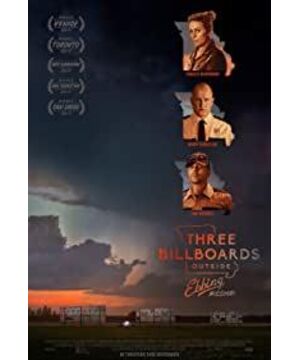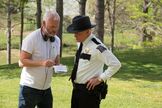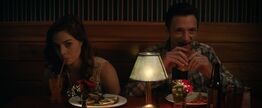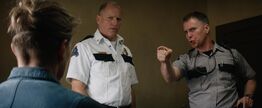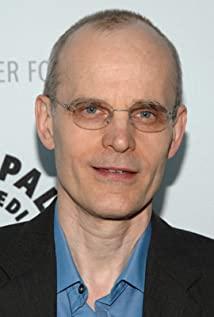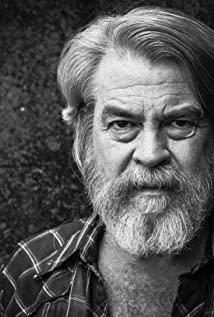Yes, Americans really like this way of expression. Otherwise, there is no way to explain why the college chose "Dallas Buyers Club" instead of "Drunk Country Folk Songs." It may be that less than three hundred years of national history has allowed them to be less constrained by rhetoric in their narratives. As a result, most of the recognized styles of works are so straightforward, as if they were printed in those three advertisements. The words on the card are equally simple and extensive. Plot/open line From the plot (of course also for fun), we can regard this story as an upgraded game of killing monsters. To be precise, it should be fighting monsters, leveling up, fighting again, regenerating, fighting again, surviving, and finally hit the ultimate boss, but the player suddenly went offline after the group was formed. This film does not, like other films with neat structures, strictly follows the overall screenwriting method of inheritance and transformation. Instead, the story is divided into multiple unclear chapters. The plot design is advanced in accordance with the chapters. Each chapter can be regarded as an independent short story with its own complete rhythm. As the chapter progresses to complete the development of the story, the intensity of conflicts also deepens, so as to shift in a step-by-step manner like a car shift. Push the film to a climax as a whole. Technically speaking, "Scarface" is the top work of this kind of film. The advantage of this arrangement is that it is not easy to get out of the way, because each chapter is relatively complete in story, so it can provide the audience with more information in a short time, and the audience may receive more information. Less "boring" feeling. Secondly, because more information can be generated, the film has the hard conditions to express more things, and the plot naturally becomes fuller. However, the shortcomings of chapterization are also obvious. One is that it is not easy to grasp the rhythm. Take this film as the clues are fragmented, the narrative is urgent, which affects the perception; the other is that it cannot be fully prepared. The stories appear at different times, such as the suicide of the sheriff, the burning of billboards, Congliang of the detectives, and the garrison overseas. They all appear abrupt and require the audience to rationalize themselves and affect the audience's understanding of the film. Although the dark lines are slightly fragmented on the open line of the plot, the dark lines of the film are completed very well overall. There are some recognized methods for resolving internal conflicts in communities (countries, communities, groups, families, etc.). We usually call those methods involving public affairs as means of social governance. The dark line of this movie is the display of these methods. According to the time sequence of appearance, they are law of the jungle, law, morality, and politics. Recall the plot. At the beginning of the film, McDomond was in a state of unsatisfied demands. At this time, she chose a simple and straightforward relief method. She advocated her justice by shouting to the public power and the public. This is itself. An act of empowering oneself showed that the mother of the victim at that time still believed in rules such as the weak and the strong; at the same time, her position was also quite radical, which can be reflected in the negotiations between Woody Harrison and her. She advocated that "I would rather kill a thousand by mistake than spare one", and the sheriff responded that this practice violated the Civil Rights Act. Naturally, in suppressing the impulse to invade others caused by the desire for revenge, the role of legal social governance is brought forward. The subsequent suicide of the sheriff can be seen as creating a state of lack of law in the frame of the story, causing the contradictory parties to further lose control, thus bringing up a hypothesis of "what will be the result of the lack of effective governance methods". As a result, we all saw that Sam Rockwell went to assault the citizens, and McDomond went to the police station on fire. Then we saw that this state of anarchy was lifted and the contradiction was resolved through the preaching of the dead sheriff and the moral law spoken by his ex-husband’s girlfriend, rather than the (already absent) legal compulsion. Highlight the role of morality. As the lines in the film say, people stay patient because people still have hope. In other words, without hope, there is no basis for maintaining respect for morality. After having laws in a barbaric state and morality in a state of inability, the film presented its final assassin, an opponent with absolute power. In fact, if the potential murderer is not a returning overseas garrison, he will not be protected by power, so he is not untouchable, so when we talk about absolute power, we are actually talking about the person behind him. The power of the state, McDomond and their true opponents, is this power. It is conceivable that an individual has no chance of winning in the face of such an opponent, so what is the use of maintaining patience and following the guidelines of inner morality? The film chooses to end at this time, leaving the characters in a tightrope walking state. I think this is the brightest part of the whole film, and the reason will be discussed later. figure In terms of character settings, the character of the characters in the movie is not static. Although this processing method is naturally lacking in self-consistent, it is in line with the development of the plot, and more importantly, in line with the laying out of the dark lines. As mentioned earlier, the dark line of the film starts from the exploration of the law of the jungle, and the development of the characters is basically based on this logic, from a natural person to a citizen step by step. The specific process is also mentioned above. After the character has experienced the weak, the legal restriction, and the moral education, he finally reached the end of the film. In the end, he has to face the opponent with absolute power, and the blank space at this time is quite interesting. When McDomond said "we think as we walk", who did she tell it to? We see that things have reached such a point that in order to avoid the worst outcome, one of the two sides of the game must make a concession, otherwise it will be a dead end. And when the plot design has left the protagonists with no room for concessions, McDomond said that we were thinking as we walked, who else could she tell? The game is a matter for both parties. Since one party has exhausted the means to eliminate tension and tension still exists, then the responsibility naturally comes to the other side. Therefore, "we think while walking" means setting aside time and opportunity, but this time and opportunity cannot be reserved for ourselves, but can only be reserved for the other party-"We are waiting, what do you do?" In this way, the film completes its call to public power, and it also echoes the slogan on the billboard at the beginning. Furthermore, the gesture of shouting is not difficult to understand. Its rationality is that although absolute power represents absolute power, under a reasonable structure of checks and balances, power is not unacceptable to compromise-if it still cares about public opinion. So after law and ethics, I think there are reasons to think so, "Three Billboards" finally introduced the resolution of contradictions into the political realm. In this field, what is emphasized is not primitive violence, legal coercion, or moral preaching. In this field, compromise is the highest art. At this point, after grasping the power granted by the system and knowing how to use it, the character has also completed the transformation from a natural person to a citizen. Having said so much, we don't know what the two people think in the end. But let this story go along the road with music. After all, there are countless contradictions in the real world waiting for us to resolve.
View more about Three Billboards Outside Ebbing, Missouri reviews


